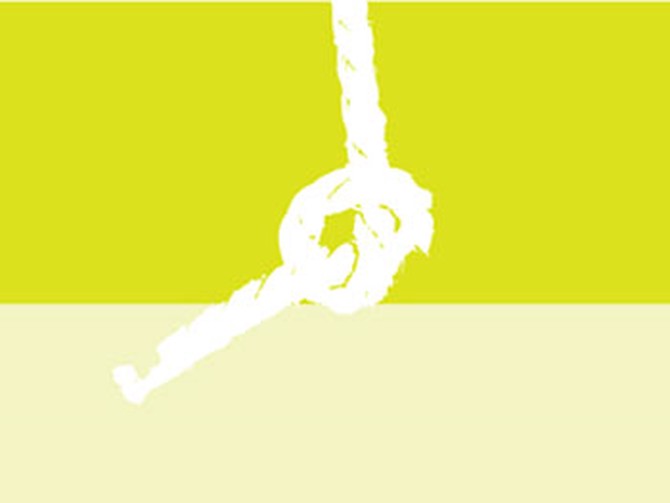How to Be Happy, Dammit!
When you're a cynic, feeling negative can sometimes be easier than thinking happy thoughts. Get a new perspective with these 11 fresh ideas from Karen Salmansohn's book How to Be Happy, Dammit: A Cynic's Guide to Spiritual Happiness.
By Karen Salmansohn

Pain exists. Life can hurt. Like, a lot. Even when you're good, you can get whacked. Without apology, Without explanation. Well, at least not right away. It's not until later, that you finally learn...

That pain back in LIFE LESSON Number 1 was for your benefit. You were being taught to breathe, invited to suck down a yummy oxygen/nitrogen cocktail. That painful whack was necessary for your growth. Of course, had you been told this at that time, you still would not have understood with your naïve lil' baby mind. And so it goes for much of the pain in your life. Often you need to evolve a bit more before you can understand a bit more.
By now you know: you live in a world of 1,000,001 interpretations.
By now you know: you must resist staying stuck on merely one.
By now you know: you live in a world of 1,000,001 interpretations.
By now you know: you must resist staying stuck on merely one.

You always have a choice of emotional response to life.
Happiness is not about what happens to you, but how you choose to respond to what happens. That's why it's called happiness not happenness—though it could be called hope-ness. You must always leave room for hope that all has happened for good cause.
Or to quote the philosopher Arthur Schopenhauer: "Life may be compared to a piece of embroidery of which, during the first half of our time, we get a sight of the right side, and during the second half, of the wrong. The wrong side is not as pretty...but it is more instructive; it shows the way in which the threads have been worked together [to make the pattern].
You feel this Artsy guy's got it pretty right. What he says reminds you of a tip your gardener friend told you..."Some plants are only meant to last for a certain season or a certain time, (said your gardener friend). If you try to make them live longer, you will be a bad gardener."
You were struck by how the same goes for people and jobs, how sometimes it seems people and jobs—and/or problems in general—are brought into your life for certain reasons, to stay around for a certain time, to teach you certain things. Of this you are certain.
Happiness is not about what happens to you, but how you choose to respond to what happens. That's why it's called happiness not happenness—though it could be called hope-ness. You must always leave room for hope that all has happened for good cause.
Or to quote the philosopher Arthur Schopenhauer: "Life may be compared to a piece of embroidery of which, during the first half of our time, we get a sight of the right side, and during the second half, of the wrong. The wrong side is not as pretty...but it is more instructive; it shows the way in which the threads have been worked together [to make the pattern].
You feel this Artsy guy's got it pretty right. What he says reminds you of a tip your gardener friend told you..."Some plants are only meant to last for a certain season or a certain time, (said your gardener friend). If you try to make them live longer, you will be a bad gardener."
You were struck by how the same goes for people and jobs, how sometimes it seems people and jobs—and/or problems in general—are brought into your life for certain reasons, to stay around for a certain time, to teach you certain things. Of this you are certain.

Fear works like Interfear—stopping you from getting what you really want/need. All too often you have to be at the end of your rope to be tempted to move through your fear...and go for the unfamiliar, the unknown, to change.

If you keep doing what you've always been doing, then you'll keep getting what you've always been getting. You must courageously break the habit of your habits, or every year you will be doomed to live out: "Same #&%&!. Different Outfit." The style of your clothes may change, but the style of your circumstances won't.
"The Elephant Truly Never Forgets"
The first trick an elephant trainer teaches an elephant is not to escape. When the elephant is still but a baby, the trainer chains the infant's leg to a huge log, so when/if the elephant tries to escape, the log proves stronger and he gives up. Eventually the elephant becomes so used to its captivity, that even when it has grown huge and strong, all the trainer has to do is merely tie the chain around the elephant's leg to anything—even a tiny little twig—and the elephant won't even try to escape.
It has become a prisoner of its past.
This elephant and its twig remind you of you and your childhood. Though you believe childhood habits can be broken. You say: childhood shmildhood. In fact, you often feel yours was more of a "shmildhood." And your parents were often more like "shmarents."
But so what? That was then. This is now. Time has passed. You can let go. Move on...Can't you? Yes you can...step back from that twig! The trick is: you must first see it's only a silly lil' twig.
"The Elephant Truly Never Forgets"
The first trick an elephant trainer teaches an elephant is not to escape. When the elephant is still but a baby, the trainer chains the infant's leg to a huge log, so when/if the elephant tries to escape, the log proves stronger and he gives up. Eventually the elephant becomes so used to its captivity, that even when it has grown huge and strong, all the trainer has to do is merely tie the chain around the elephant's leg to anything—even a tiny little twig—and the elephant won't even try to escape.
It has become a prisoner of its past.
This elephant and its twig remind you of you and your childhood. Though you believe childhood habits can be broken. You say: childhood shmildhood. In fact, you often feel yours was more of a "shmildhood." And your parents were often more like "shmarents."
But so what? That was then. This is now. Time has passed. You can let go. Move on...Can't you? Yes you can...step back from that twig! The trick is: you must first see it's only a silly lil' twig.

You must declare your own Independence Day, then your own Independence Year, then your own Independence Life. The purpose of your life is to find the purpose of your life.
This means: you must listen to your heart, listen to your belly, listen to NPR—but you must stop listening to your shmarents and your shmriends. (After all, just look at their crazy fruit trees!)
You realize: being who you want to be, and doing what you want to do, is self-respect. But that's not all, folks. It's also one of your Pot of Primordial Stew Club Membership Duties. Something even your Pot Mate the flower knows to wisely cash in on. A flower instinctively goes toward the light. It doesn't spend time worrying if people will mistake it for a weed or if it's taking too much sun. It wisely and simply follows its primal flower gut instincts to attain its highest level of flowerosity.
Conversely, you—and your busy, busy brain—have been programmed to think, think, think—and so you have been ignoring your heart's instincts. Just like that eagle in its chicken days. It's when that eagle finally followed its heart that her life finally began to soar.
This means: you must listen to your heart, listen to your belly, listen to NPR—but you must stop listening to your shmarents and your shmriends. (After all, just look at their crazy fruit trees!)
You realize: being who you want to be, and doing what you want to do, is self-respect. But that's not all, folks. It's also one of your Pot of Primordial Stew Club Membership Duties. Something even your Pot Mate the flower knows to wisely cash in on. A flower instinctively goes toward the light. It doesn't spend time worrying if people will mistake it for a weed or if it's taking too much sun. It wisely and simply follows its primal flower gut instincts to attain its highest level of flowerosity.
Conversely, you—and your busy, busy brain—have been programmed to think, think, think—and so you have been ignoring your heart's instincts. Just like that eagle in its chicken days. It's when that eagle finally followed its heart that her life finally began to soar.

This is the secret to happiness—in 3 words:
You decide to see...equals.
Your enemies = your teachers.
Your failure = your wisdom.
Your mistakes = your lucky discoveries.
Your conflicts = your growth opportunities.
Your undesired endings = your desirable beginnings.
Your grapes of wrath = your raisons d'etre.
Your painful feelings = your proud proof that you are dealing with your feelings—head on!
And there's a freebee bonus benefit to doing the above...You begin to be less judgmental about your: rage, fear, pain, conflicts, and disappointments...not only for what has happened in the past but also when it comes to your present and future.
- rationalize
- rationalize
- rationalize
You decide to see...equals.
Your enemies = your teachers.
Your failure = your wisdom.
Your mistakes = your lucky discoveries.
Your conflicts = your growth opportunities.
Your undesired endings = your desirable beginnings.
Your grapes of wrath = your raisons d'etre.
Your painful feelings = your proud proof that you are dealing with your feelings—head on!
And there's a freebee bonus benefit to doing the above...You begin to be less judgmental about your: rage, fear, pain, conflicts, and disappointments...not only for what has happened in the past but also when it comes to your present and future.

When you become calm and serene on the inside, the world becomes more calm and serene on the outside. You find that when you meditate more, you make better choices more—find better people more—and better opportunities more. So much so...it feels almost like magic!
Some may call this good fortune "synchronicity." Some may call it "luck." Some may call it "intuition." Some may call it Ralph. (Admittedly, very few people, though.) Some may call it "tapping into the collective unconscious." But you're a rational person, so you prefer to call it what scientists call it: The invisible energies of chaos theory at work.
Some may call this good fortune "synchronicity." Some may call it "luck." Some may call it "intuition." Some may call it Ralph. (Admittedly, very few people, though.) Some may call it "tapping into the collective unconscious." But you're a rational person, so you prefer to call it what scientists call it: The invisible energies of chaos theory at work.

Worry and doubt can actually be prayers and visualizations—and self-fulfilling programming—for things you do not want. The world is your mirror. Everything is created twice. What you have running in the programming of your mind eventually manifests itself in the outer world.
So if you want to change your outer world, you must first change your internal mental programming. When you try to change the external world first, it's like trying to change the picture on a TV screen by rubbing that picture with a cloth. You can rub, and rub, and rub—but it's futile, baby.
However...when you change your mental programming—who you are thinking you are and what you are thinking you deserve—you find the world around you changes simultaneously.
So if you want to change your outer world, you must first change your internal mental programming. When you try to change the external world first, it's like trying to change the picture on a TV screen by rubbing that picture with a cloth. You can rub, and rub, and rub—but it's futile, baby.
However...when you change your mental programming—who you are thinking you are and what you are thinking you deserve—you find the world around you changes simultaneously.

When you let go of unnecessary attachments, you pick up speed in heading toward your true goals. For this reason, it's always better to have a short bad relationship than a long bad relationship. Or a short unsatisfying career versus a long unsatisfying career.
The sooner the eagle flies the coop, the sooner the high-flying eagle livin' begins. Though you also know it's scary to let go. What if you fall? What if you don't have eagle wings after all—and cannot fly?
The sooner the eagle flies the coop, the sooner the high-flying eagle livin' begins. Though you also know it's scary to let go. What if you fall? What if you don't have eagle wings after all—and cannot fly?

You need balance, baby. It's called the weekend—and not the "weakened." It's not "he who dies with the most toys wins." It's "he who has the most time to play with his toys and the most fun playing with them who wins." In other words: all work and no play means a life of all ego and no spirit.
True success is not about making lots of moola so you can get yourself expensive toys for your ego—nor is it about getting yourself a cute, sexy person for your ego. True success is about satisfying your spirit with spirit things. For instance, your ego looks at a cute, sexy person and says, "Yum, yum. I want that person." But your spirit is smarter. It looks at loving, joyous couples and thinks, "Mmmm, I want that joy, that happiness, that love."
Your spirit wisely knows: it's not a mate's superficial qualities that ultimately make you happy, but the dynamic this mate and you have together—and the blissful feelings this mate can give you in your true (and eagle) heart. Which reminds you of a lesson you learned reading The Little Prince: "It is only with the heart that one can see rightly; what is most important is invisible to the eye." And with this in mind—and in heart—you decide to let this wise spirit of yours do all your life shopping.
And with this in mind—and heart—you also decide: next time a paramour's not gonzo, then you're gone-zo. Because you now know: a paramour without love is merely an empty container. And who wants an empty container? The container is not the sustainer. You must not confuse the bottle for the juice. The bottle might satisfy your ego, but only the juice can feed your heart.
Karen Salmansohn is a best-selling author known for creating self-help for people who wouldn't be caught dead reading self-help. Click for online information about this and other Random House, Inc books and authors.
More from Karen Salmansohn
True success is not about making lots of moola so you can get yourself expensive toys for your ego—nor is it about getting yourself a cute, sexy person for your ego. True success is about satisfying your spirit with spirit things. For instance, your ego looks at a cute, sexy person and says, "Yum, yum. I want that person." But your spirit is smarter. It looks at loving, joyous couples and thinks, "Mmmm, I want that joy, that happiness, that love."
Your spirit wisely knows: it's not a mate's superficial qualities that ultimately make you happy, but the dynamic this mate and you have together—and the blissful feelings this mate can give you in your true (and eagle) heart. Which reminds you of a lesson you learned reading The Little Prince: "It is only with the heart that one can see rightly; what is most important is invisible to the eye." And with this in mind—and in heart—you decide to let this wise spirit of yours do all your life shopping.
And with this in mind—and heart—you also decide: next time a paramour's not gonzo, then you're gone-zo. Because you now know: a paramour without love is merely an empty container. And who wants an empty container? The container is not the sustainer. You must not confuse the bottle for the juice. The bottle might satisfy your ego, but only the juice can feed your heart.
Karen Salmansohn is a best-selling author known for creating self-help for people who wouldn't be caught dead reading self-help. Click for online information about this and other Random House, Inc books and authors.
More from Karen Salmansohn
Published 11/06/2000

